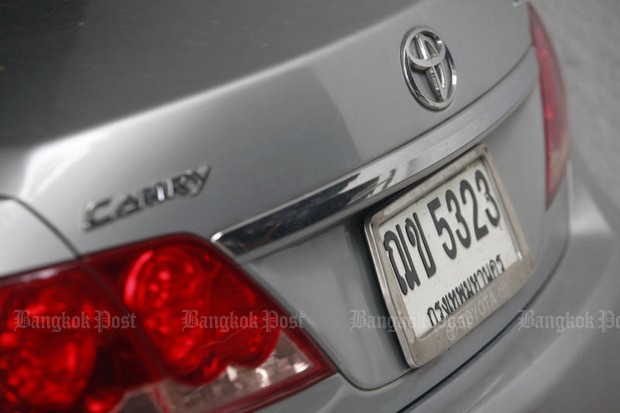
A new chairman has been appointed to head the committee investigating three police officers accused of driving former prime minister Yingluck Shinawatra to the border.
Less than 24 hours before the five-member panel was due to start work, Metropolitan Police Bureau (MPB) chief Sanit Mahathavorn signed an order on Sunday appointing his deputy, Panurat Lakboon, to replace Pol Col Kiattipong Nala, a deputy chief of the MPB's Division 5, as chairman.
Pol Maj Gen Panurat confirmed on Monday that the order had reached him on Sunday night.
The leadership change delayed the start of the inquiry by 24 hours, from Monday until Tuesday. It will investigate Pol Col Chairit Anurit, also a deputy chief of Division 5, and two other officers of lower rank who allegedly drove Ms Yingluck to the border in Sa Kaeo.
The replacement of the chairman follows criticism the panel would be toothless if headed by an officer of the same rank as the most senior officer at the centre of the matter, a police colonel.
Pol Maj Gen Panurat acknowledged the change was due to the rank issue.
The probe will merely focus on disciplinary issues, whether the three officers stepped beyond their duty by taking the former prime minister to the border.
Ms Yingluck skipped bail and fled to the Cambodian border in Sa Kaeo before the Supreme Court's Criminal Division for Holders of Political Positions was due to rule on Aug 25 in the negligence case stemming from her government's corruption-plagued rice-pledging programme.
The Cambodian government has repeatedly denied she left through Cambodia.
The court on Aug 25 issued an arrest warrant and set this Wednesday as the new date to hand down the ruling, with or without her appearance at the courthouse.
Meechai Ruchupan, a legal expert and chief constitution writer, commented on Monday on the penalties facing the policeman who allegedly helped Ms Yingluck get out of the country.
“He will face disciplinary action and criminal action. A review must be made to determine whether his actions are ‘serious offence’. If it’s not, then we need to review the police’s standards. If it is, he could be fired,” he said.
Unlike her brother, Ms Yingluck, if found guilty, will likely be the first politician for whom the statute of limitations applying to her case will never expire under a new law. Unless she appeals, she would have to avoid being arrested the rest of her life.
Mr Meechai said if the Supreme Court for politicians ruled Ms Yingluck guilty of malfeasance on Wednesday, the statute of limitations of her rice-pledging case, 15-20 years, would apply normally even though she was not in Thailand.
But once the Supreme Court for politicians procedural bill comes into effect, the countdown would stop and she could be made to serve the time whenever she is arrested, he added.
The bill has been passed and is being submitted for royal endorsement.
Under the new law, the statute of limitations in cases against politicians will be frozen if defendants cannot be brought to serve time.
A similar transition is seen in the appeal process.
Mr Meechai said if Ms Yingluck is found guilty she could assign a lawyer to appeal on her behalf, but only if there are new facts to be presented in the case.
“But once the new law takes effect, she has to personally file the appeal herself, but she can appeal in terms of both facts and legal aspects,” Mr Meechai said.
The window for appeal is 30 days.
